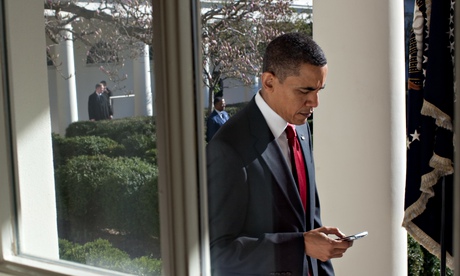
Barack Obama is considering ditching his BlackBerry for a rival mobile phone brand, in what would be a symbolic blow to the struggling Canadian handset maker.
The White House Communications Agency (WHCA), which provides communications systems for the president and the secret service, is considering switching from the keyboard-based device the US president has used since he was a senator to a touchscreen handset. According to reports in the Wall Street Journal, products by South Korean technology groups Samsung and LG are being considered.
For BlackBerry, the incursion of Samsung or LG into the White House would be the final fall from grace. The company has plummeted from its once-essential position among government and business users because of its encrypted email system to become a lossmaking also-ran. Last November it had to raise $1bn (£610m) in debt financing after an attempt to engineer a sale failed and its chief executive, Thorsten Heins, was jettisoned in favour of industry veteran John Chen. The company is due to announce its fourth-quarter earnings next Friday, having recorded net losses of $5.5bn over the previous three quarters on revenues of $5.8bn.
For Samsung or LG, a switch would be a huge publicity coup after becoming powerful players in the fast-growing smartphone market. Samsung is the world's largest smartphone manufacturer.
A switch could be "months away", the Wall Street Journal said. Although Obama uses an Apple iPad for some activities, there is no indication that the WHCA is considering an iPhone for his use.
If Obama were to give up his BlackBerry – which when on the campaign trail in 2008 he said would "have to pry it out of my hands" – then he would be following millions of Americans who have fallen out of love with what was once the most popular smartphone in the US. In September 2010 there were 21 million BlackBerry owners in the US – but by January this year that had fallen to fewer than 5 million, according to research company ComScore.
Obama has been an affirmed BlackBerry user for at least a decade, but after becoming president in 2008 he had to give it up briefly for a secure Sectera Edge phone specially created by the National Security Agency. But that was quickly replaced by a customised BlackBerry with special security software called SecureVoice, developed in conjunction with the National Security Agency.
The Department of Defense – which runs the WHCA – and the White House did not respond to a Guardian request for comment before publication.
BlackBerry said that "for more than a decade, BlackBerry has been securing the US government's mobile communications and only BlackBerry is designed to meet the high-security needs of US and allied government agencies".
It added that: "Other vendors such as Samsung and LG still have a long way to go to catch up to meet the government's stringent requirements and certifications."
A big concern for the US security agencies would be to make any phone that the first family uses completely secure against eavesdropping or other forms of hacking. That would involve careful reviews by the NSA and DoD.
Samsung is the second-biggest smartphone brand in the US behind Apple. Its Knox software to protect phones against hacking has also been approved for use in the US Department of Defense, along with the iPhone, where they are being considered for contracts worth hundreds of millions of dollars.
BlackBerry meanwhile has been struggling to survive. During the past year it has sold off one of two private jets and has begun disposing of land and buildings, selling $36m worth to the University of Waterloo and announcing the sale of a further 3m square feet of business space and land to an unnamed buyer to be completed in the coming two months. "The successful sale of property in Canada will help us move toward our goal of continued operational efficiency," said John Chen, BlackBerry's chief executive.

